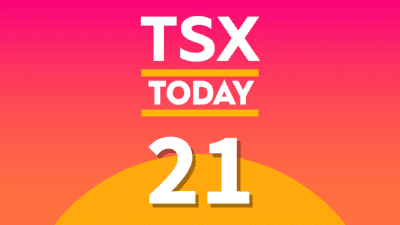Savings accounts can be a great way to save up a small amount of money for a short time. However, over long periods, savings accounts, — or any investment such as a GIC that pays out 2% interest or less — will become super inefficient.
The reason? Bank of Canada is aiming to keep inflation at 2% in order to keep the economy healthy, so over the long term, cash is losing roughly 2% of its value annually.
At the moment, inflation in Canada is actually higher than 2%, with Statistics Canada reporting just last week that Canada’s inflation rate was closer to 2.4% in January.
In addition, the economy continues to heat up, adding more new jobs for the seventh straight month in January. As the economy heats up, so too does the stock market, which has already been on a massive rally. Not investing in the stock market therefore means a big opportunity cost.
Passing up much higher growth rates in the stock market in favour of holding cash, which is losing you money, can be a disastrous mistake.
Instead, consider buying an Index ETF.
Index ETF’s are great for beginner investors or those investors who just don’t have enough time to do adequate stock research.
A decade ago, buying an index fund wouldn’t have been such a good option, but heavy competition in the industry and improved technology has driven the costs of these funds down considerably, now making it a high-quality option for investors looking to gain exposure to the stock market.
Even massive companies use index funds, to store large sums of capital rather than leaving it in cash, as the returns from cash will almost always be negative.
Two index funds for investors to consider are the iShares S&P TSX 60 Index ETF (TSX:XIU) and the iShares Core S&P 500 Index ETF CAD Hedged (TSX:XSP).
TSX Index ETF
The XIU ETF is a great way to gain exposure to the Canadian market by getting indirect ownership of some of the top companies on the TSX, paying the same commission you would if you were buying just one stock, and an ultra-low management expense ratio of just 0.18%.
The fund holds 60 of the top stocks on the TSX spread across 10 industries, and is most exposed to the major businesses such as bank stocks and other industry leaders such as Enbridge or Nutrien.
The fund has performed well the last 12 months, up roughly 12%, not too shabby for a passive investment that investors can buy and forget about.
It also pays a dividend that has a trailing yield of 2.7%, a pretty significant dividend for an equity index fund.
S&P 500 ETF
There’s nothing wrong with the XIU that would lead investors to need to look elsewhere; however, investing in only one index fund severely limits your upside potential, especially if the Canadian market underperforms other markets like the S&P 500, which has been the case the last few years.
It’s important to diversify across different indexes, because different countries and different economies can experience growth at different times.
In addition, because the fund is hedged to the Canadian dollar, it’s a much safer way to invest long term, without investors needing to worry about foreign exchange risk.
The fund is entirely invested in a similar U.S S&P 500 index fund, but with some derivative exposure to hedge the Canadian dollar. The fund it holds has exposure to top U.S stocks such as Microsoft, Apple and Amazon, as well as more than 500 others.
The fund has a management expense ratio of just 0.1%, pays a dividend with a trailing yield of 1.65% and is up roughly 20% over the last 12 months.
Bottom line
If you don’t do anything with your money or you earn return rates below the rate of inflation, your wealth will slowly start to evaporate.
Instead, invest your money as soon as you can, while still doing proper research and ensuring your capital is as diversified and any risk is as minimized as possible.









